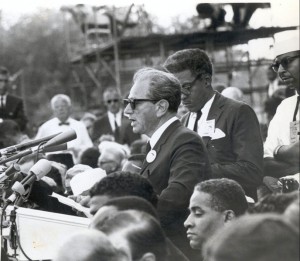A 13-year old Bar Mitzvah boy in Dallas recently made headlines. In a strident article in the Washington Post, Rabbi David Wolpe criticized the burlesque-themed Bar Mitzvah party thrown for the young man, whom he identified “Sammy.”
“To turn a ceremony of spiritual maturation into a Vegas showgirl parade teaches a child sexualization of spirit. Apparently nothing in our society militates against the narcissistic display of short-skirted dancers ushering an adolescent into unearned stardom,” Wolpe wrote.
He continued with a rhetorical question “I am leery of being too maudlin but really, our ancestors struggled and suffered and fasted and prayed so Sammy could cavort?”
The Call For Self-Examination
Wolpe’s article went viral (at least amongst the Jewish community), as we asked ourselves about the propriety of Bnei Mitzvah celebrations in our communities.
I agree with Wolpe’s central point. Some Bnei Mitzvah celebrations go too far. The purpose of becoming a Bar or Bat Mitzvah is not to throw a big party. It is to read and teach Torah. It is to assert and celebrate one’s Jewish identity. It is to begin to take responsibility for our spiritual lives. When we confuse the party with the purpose, we teach the wrong lessons.
When Words Humiliate
Yet, what bothered me about Wolpe’s article was its vituperative tone and singling out of one young man by name. It felt mean-spirited and condescending toward a thirteen year-old-boy.
“Poor Sammy,” Wolpe wrote. “What remains to him of the small triumphs of life? When he struggles with math and earns a ‘B’ when before he could never do better than a ‘C’ will they purchase an island to mark the occasion? Will he take Air Force One to his prom?”
Is such personal humiliation necessary? Jewish law considers lashon harah, malicious language, among the worst transgressions. We need to be extraordinarily careful with our words. Even if we apologize (which Wolpe has done), we cannot undo them.
How To Make Amends
Words are like feathers. An old Jewish folk story tells of a man who sought to make amends as he neared the end of his life. He recalled many of the awful words he had said to those he loved. He asked his rabbi what he needed to do.
The rabbi instructed him to place a bag of feathers in front of the homes of each person he had hurt with his words. The man did so. He felt good. It seemed like an easy way to make amends.
Then the rabbi told him to go out and retrieve every feather he had placed in front of each home. The man turned white. “That’s impossible,” he said. “They have flown off around the world. There is no way I can get them all.”
“So it is with our words,” responded the rabbi. “They spread out like feathers, and we can do nothing to get them back.”
We need to be extra-careful with the words we say. “Life and death,” King Solomon reminded us, “lie in the power of the tongue.”
To get free weekly spiritual inspiration from Rabbi Moffic, click here.


